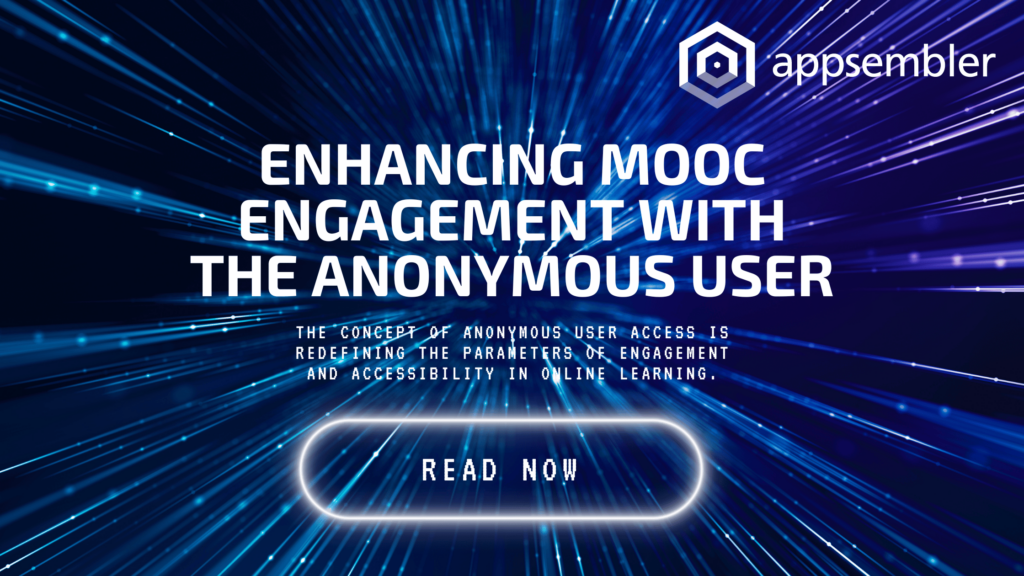In the rapidly evolving landscape of digital education, the concept of anonymous user access is redefining the parameters of engagement and accessibility in online learning. This article delves into the significance of enabling potential learners to explore course content without the hurdles of registration, examining its impact on MOOCs (Massive Open Online Courses) and the broader eLearning ecosystem. Through the lens of SEO, student engagement, and course discoverability, we uncover the transformative potential of anonymous access in democratizing education and enhancing the learning experience.
Key Takeaways:
- Anonymous user access lowers barriers to entry, making learning more accessible to a wider audience.
- Implementing an “Explore Course” feature can significantly improve course enrollment and completion rates.
- SEO plays a critical role in attracting potential students through relevant searches, with anonymous access amplifying course visibility.
- Anonymous browsing allows for a more informed decision-making process for potential students, potentially leading to higher engagement.
- While offering numerous benefits, anonymous access requires careful consideration of engagement tracking and the depth of learner commitment.
Table of contents
Introduction
In the ever-evolving realm of digital education, online training courses have burgeoned, offering unprecedented accessibility to knowledge across the globe. This transformative era in education has been markedly propelled by Massive Open Online Courses (MOOCs), which democratize learning by providing free, high-quality education to anyone with internet access. However, the liberating ethos of MOOCs also encapsulates their most pressing quandaries: the conundrums of revenue generation and student completion rates.
As these digital classrooms continue to expand their reach, the intrinsic value of MOOCs—educational accessibility for all—clashes with the practicalities of sustaining such platforms. Without the traditional tuition fees to bolster their financial viability, MOOC providers often find themselves at a crossroads, seeking innovative solutions to maintain and enhance the quality of education they offer. Moreover, a more subtle yet pervasive challenge lurks within the participation metrics: student completion rates. A significant number of learners embark on these online voyages with zeal, yet a mere fraction navigate to the journey’s end, completing the courses they enroll in. This alarming trend not only undermines the potential of MOOCs to bestow comprehensive education but also muddles the data necessary for improving course content and delivery.
As we delve deeper into the nuances of online education, it becomes evident that the key to unlocking the full potential of MOOCs lies in understanding and addressing these unique challenges. Bridging the gap between accessibility and sustainability, while enhancing student engagement and completion rates, remains the pivotal focus of the digital learning community. This exploration sets the stage for a profound inquiry into the role of anonymous users in this context, a concept that may hold the keys to the future of MOOCs.
The Problem with MOOCs
Within the vibrant landscape of online education, MOOCs (Massive Open Online Courses) have emerged as beacons of learning democratization, enabling access to quality education for anyone, anywhere. Yet, beneath this gleaming surface lies a nuanced challenge that threatens the very efficacy and sustainability of MOOCs: student attrition and the reliability of data derived from course participation.
The phenomenon of high dropout rates in MOOCs is more than a mere statistical concern; it is a critical barrier to the iterative improvement of courses. As educators and course developers, the aspiration is not only to disseminate knowledge but to do so effectively, ensuring that learners not only enroll but also complete the courses, integrating and applying the knowledge gained. However, the reality presents a stark contrast, with a significant proportion of students disengaging before course completion. This attrition not only diminishes the impact of MOOCs but also skews the data on which educators rely to refine and enhance learning experiences. When participation data is populated by starts without finishes, the ability to discern what works—and what doesn’t—within a course becomes muddled, complicating efforts to tailor and improve educational content to meet student needs more effectively.
Compounding this challenge is the dilemma of student engagement, particularly the phenomenon of window-shopping behavior among potential learners. Many individuals approach MOOCs with a tentative curiosity, keen to explore what courses offer without the commitment of enrollment or completion. This browsing mentality, while understandable, further complicates engagement metrics and highlights the significant barrier of account creation. The necessity for potential learners to create an account before accessing course materials can deter even the most interested individuals, effectively nipping their educational journey in the bud. This initial hurdle not only reduces the number of engaged learners but also limits the ability of MOOC providers to understand and cater to the needs and preferences of their audience.
Together, these challenges underscore a critical conundrum within MOOCs: how to balance the openness and accessibility that define these platforms with the need for meaningful, sustained engagement and reliable data for course improvement. As the digital education landscape continues to evolve, addressing these issues will be paramount in realizing the full potential of MOOCs as vehicles for widespread, effective learning.
Introducing the Anonymous User Experience
In an era where the digitalization of education is ever-expanding, the introduction of the anonymous user experience marks a pivotal evolution in the accessibility and engagement of online learning platforms. This innovative approach, exemplified by Stanford University’s ingenious implementation of an “Explore Course” button, serves as a beacon of inclusivity and user-centric design in the realm of Massive Open Online Courses (MOOCs).
Stanford’s model allows potential learners to delve into course content with the freedom of anonymity, bypassing the conventional barrier of account creation. By simply clicking the “Explore Course” option, users are granted a comprehensive preview of the course’s offerings, from lecture materials to interactive elements, without the need to register or commit. This unique feature embodies a significant stride towards accommodating the curious and the cautious alike, offering a glimpse into the course’s value and relevance before making the decision to engage more deeply.
The benefits of such non-registered mode access extend far beyond user convenience, casting a wide net of advantages that enrich both the learner’s experience and the course’s impact. Firstly, it significantly enhances data accuracy for MOOC providers. By distinguishing between genuinely interested participants and those merely browsing, educators can garner more reliable insights into engagement and effectiveness. Additionally, lowering the entry barriers to course content not only amplifies the potential reach of educational offerings but also democratizes access to knowledge, ensuring that the first step towards learning is as simple as a click, free from the deterrent of formal registration processes.
This approach, championed by Stanford University, stands as a testament to the transformative potential of prioritizing accessibility and user agency in the digital education landscape, paving the way for a more inclusive and insightful future in eLearning.
Appsembler: Facilitating Anonymous Access for MOOCs
In the quest to enhance the engagement and accessibility of Massive Open Online Courses (MOOCs), Appsembler emerges as a pioneering force, steering the Open edX platform towards a more inclusive and user-friendly future. With its innovative solutions, Appsembler empowers educators and institutions to adopt the anonymous user feature, a key to unlocking the full potential of digital learning experiences.
Appsembler’s contribution to the Open edX community extends far beyond mere functionality; it redefines the way learners interact with online courses. By facilitating anonymous access, Appsembler allows potential students to explore course content without the commitment of account creation, thereby lowering the barriers to entry and inviting a broader audience to sample educational offerings. This capability not only enhances user engagement but also serves as a powerful tool for educators to gauge interest and refine their courses based on actual browsing behaviors, not just registered engagements.
The impact of Appsembler’s interventions is not anecdotal but rather evident in the success stories that dot its landscape. Institutions and course creators leveraging Appsembler’s services have reported a noticeable uptick in course explorations, with many curious learners transitioning to engaged participants. For instance, a leading university utilized Appsembler to enable anonymous access for its series of professional development courses, resulting in a significant increase in completed enrollments. This surge in engagement underscores the efficacy of Appsembler’s approach in making learning more accessible and appealing to a global audience.
Through these enhancements to Open edX and the tangible successes experienced by educational providers, Appsembler stands out as a beacon of innovation, guiding the eLearning community towards a future where knowledge is not just available but truly accessible to all.
SEO and Accessibility Benefits
In the digital age, the visibility of online educational content is paramount to attracting and retaining learners. The advent of anonymous user access within the realm of MOOCs (Massive Open Online Courses) heralds a significant shift not only in user engagement but also in how courses are discovered via search engines. This innovative approach serves as a catalyst for enhancing the SEO (Search Engine Optimization) footprint of online courses, thereby broadening their reach and appeal to a global audience.
Allowing potential learners to explore course content anonymously can significantly impact a course’s visibility on search engines like Google. When content is accessible without the need for registration, it becomes more readily indexable by search engines, ensuring that it appears in relevant searches conducted by prospective students. This increased visibility is crucial in a digital landscape where the majority of users turn to search engines to find resources that meet their learning needs. SEO, in this context, acts as a bridge connecting educational content with those who seek it, emphasizing the importance of keywords, meta descriptions, and content accessibility in drawing in an interested audience.
The integration of anonymous access and strategic SEO practices addresses several challenges inherent in MOOCs, including low engagement rates and the difficulty in reaching potential learners. By making courses more discoverable and allowing for a non-committal exploration of content, educators can attract a wider audience, increase the likelihood of course completion, and gather more accurate data on learner engagement. This approach not only elevates the learner’s experience but also ensures that educational content is as accessible as it is impactful, paving the way for a more informed and engaged global learning community.
Conclusion
As we traverse the dynamic landscape of digital education, the imperative to adapt and evolve in response to learners’ needs has never been more evident. The concept of anonymous access within the ecosystem of MOOCs (Massive Open Online Courses) and Learning Management Systems (LMS) stands as a testament to the innovative strides being made towards inclusivity and accessibility in eLearning. This approach not only dismantles barriers to entry but also enriches the learning experience by aligning with the diverse preferences and circumstances of a global learner base.
The journey through the intricacies of student attrition, engagement dilemmas, and the pivotal role of SEO underscores the profound impact of anonymous user access on both the visibility and viability of online courses. Institutions like Stanford University, along with platforms powered by Appsembler, illuminate the path forward, showcasing the tangible benefits of embracing such a model. From enhanced course discoverability to the nuanced understanding of learner behavior, the case for anonymity in educational exploration is compelling.
As we look to the horizon of eLearning, course creators and educators are encouraged to consider the myriad advantages of implementing anonymous access and related strategies within their offerings. In doing so, they not only expand the reach of their educational content but also contribute to a more accessible, engaging, and effective learning environment for all. The future of online education is one of openness, innovation, and unwavering commitment to meeting learners where they are, and it is within this future that the greatest potential for impact lies.
Frequently Asked Questions
Anonymous user access in online training courses refers to the ability for individuals to explore and interact with course content without the necessity of registering or revealing their identity. This feature allows potential learners to preview the structure, material, and teaching style of a course, offering a no-commitment glimpse into what the course provides. Particularly beneficial in Massive Open Online Courses (MOOCs) and eLearning platforms, anonymous access aims to lower the barrier to entry for education, making learning more accessible and reducing the friction associated with sign-up processes.
Anonymous access can significantly impact student engagement and completion rates by addressing the initial hesitation or commitment fear associated with course enrollment. By allowing learners to preview course content, educators can capture the interest of those who might be on the fence about committing to a course. This preview can lead to more informed decisions by students, who are then more likely to enroll and complete the course with a clear understanding of what to expect. Furthermore, it helps in filtering genuinely interested learners from casual browsers, potentially leading to more dedicated student cohorts and, subsequently, higher completion rates.
Yes, implementing an anonymous preview feature can improve course enrollment by making courses more accessible and less intimidating to prospective students. This feature serves as a no-risk invitation for individuals to explore what a course offers, providing them with the confidence to make an informed decision about enrollment. By demystifying course content and structure upfront, institutions can attract learners who might otherwise be deterred by the commitment of registration, thus widening the funnel of potential enrollees.
SEO, or Search Engine Optimization, plays a crucial role in attracting potential students by ensuring that a course or educational platform ranks highly in search engine results for relevant queries. Effective SEO strategies involve optimizing course descriptions, titles, and on-page content with relevant keywords, making it easier for potential students to discover these educational offerings when they search for related topics online. By improving a course’s visibility on search engines, educators can significantly increase the likelihood of attracting interested learners who are actively seeking educational opportunities.
Anonymous access benefits SEO and course discoverability by allowing search engines to index more of a course’s content, making it visible in search results. When course materials are accessible without registration, they can be crawled and indexed by search engines, thus appearing in search results for relevant queries. This increased visibility can attract more prospective learners who are using search engines to find educational content that matches their interests or needs, effectively broadening the reach of the course to a wider audience.
While anonymous access to online courses offers numerous benefits, there are potential drawbacks, including the challenge of accurately measuring engagement and completion metrics. Since anonymous users do not register or provide identifiable information, it can be difficult for educators to track progress, completion rates, and engagement levels in the same way they would for registered users. Additionally, without the commitment of registration, some users may not engage with the content as deeply or persistently as they might after making the decision to enroll formally.



